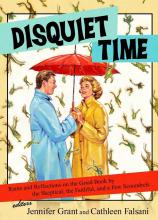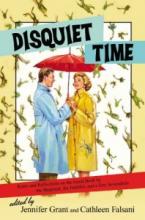quiet time

It was in my senior year of high school that I began to lose my faith in Scripture.
Then, my first year of college I read the entire Bible, cover to cover, and that pretty much destroyed what confidence I had left.
The Bible, I discovered, was full of polygamy, incest, murder, rape, genocide, adulterers, inconsistencies, impossibilities, and a whole bunch of screwed-up people who never seemed to get anything right.
The more I studied the “perfect” word of God, the more I expected that doctrine would become clear and consistent, the authors exemplary, and the stories contain distinct and readily discernible meanings.
When I read, I found I had more questions than answers, concerns than affirmations, and was more likely to feel disrupted than tranquil.
I almost gave up entirely.

I was asked to contribute a chapter to a new book called Disquiet Time: Rants and Reflections on the Good Book by the Skeptical, the Faithful, and a Few Scoundrels. The volume, an edited compilation put together by Cathleen Falsani and Jennifer Grant, takes on many of the weird texts in scripture that we either gloss over or completely ignore because they’re just too … well, weird.
Of course there are plenty of spiritual oddballs to choose from, but as soon as I got the invite, I knew I wanted to write about the book of Revelation (note that there is not “S” at the end; there is no such book as Revelationsssssssss in the Bible). Suffice it to say that my relationship with the last book in the bible is a little bit complicated. In fact, it ruined my potential career as a lifetime Baptist. A number of you may have heard bits or pieces of the story about how I got kicked out of church as a teenager, but may not know all the details.
Well kids, you can blame it all on one freaky Bible book, one intransigent teenager and a floppy-Bible-wielding youth minister. But although the experience pushed me out of church for a solid decade, it didn’t forever ruin my search for the divine. But this particular story isn’t about that. It’s about how I got one particular youth minister so red-faced and flustered that he cussed me out and almost hit me square in the noggin with the Good Book.

Maybe it’s fitting that I was scrolling through my Twitter feed when I came across this very clickable headline from the AP: “Go Figure: Facebook Read Daily More Than Bible.”
Ouch. That one hits pretty close to home. That aimless scrolling through my Twitter feed could just as easily have been time well spent in front of the Good Book. Has my daily devotion to social media really eclipsed my daily devotion to spiritual practice?
After 10 years of operation, Facebook has usage stats that put it in the stratosphere of dedicated readers. Just over half of adults in the U.S. and Canada use Facebook daily. The same cannot be said for the Bible or other religious texts. Really, it’s not even close.
The AP story notes that Facebook “says worldwide it has 757 million daily active users. Of those, 19 percent are in the U.S. and Canada, so that's more than 143 million people checking Facebook daily.”
Compare that to these numbers from the same article about those who read a religious text every day: “A 2006 CBS News poll found 15 percent of U.S. adults read the Bible or other religious texts daily. There are about 267 million adults in the U.S. and Canada. That means about 40 million people reading the Bible daily.”
In a country where 79 percent of adults claim some sort of religious affiliation, less than a quarter of that number statistically reads their religious text daily. Historically the term “People of the Book” has referred to the Jewish people and their reverence for the Torah, their holy law. Perhaps those of us in the U.S. should call ourselves “the people of Facebook.”
Bad religious puns aside, personally, I’ve never been one to read my Bible with much consistency, and certainly not on a daily basis. While I’ve tried my fair share of daily Bible reading programs, plans, and even Bible apps, I’ve yet to develop the habit of daily reading.

With six children in a Southern Baptist family in the 1970s, we could easily have had a dozen Bibles in the house. There was the giant, gray Family Bible with the embossed cover that resided on the bottom shelf of the living room, which nobody ever read. And there was a scattering of those palm-sized New Testament and Psalms around the place, like silverfish in a drawer — always white or pale green, with ersatz gold leafing that would flake off under the prodding of a fingernail.
There was a Novum Testamentum from when my oldest sister took Latin in college, sandwiched on a shelf. I also always liked the ones from the Gideons (do the Gideons even still exist?) that had translations of John 3:16 in the back. My favorite: Sinhalese.
The vast majority, though, were what could be termed “presentation Bibles.” Invariably from Broadman Press (headquartered in Nashville, the Baptist Vatican), either slick shoe-polish black or steak-slab red “bonded leather” (Ooh, baby!), these had been awarded as part of Sunday school or Scripture memorization schemes, and always had about them the whiff of bribery, with the name of the person to whom the Bible was “dedicated” written in ostentatious cursive in the front. “The Words of Christ Are in Red,” it was noted, and in the back was a sheaf of biblical maps, the topography of the Exodus, and Paul’s missionary journeys rendered in Sweet Tart pink and blue.

Every now and again I have to stop and take stock of my prayer life. And when I do that, sometimes I have to share what it's like to realize that how I pray has somehow managed to change without my conscious intention to do so. This is one of those times.
My prayer life has slipped away from me again in that I seldom if ever sit down with The Hours or my breviary and pray. It just doesn't happen. I arise in the morning and work begins. I move about my day from task to task, moment to moment, until the day is done. Idle time comes upon occasion, but not with any regularity. And Lord knows this summer's travel schedule has kept me hopping. Such a schedule keeps my brain busy as well. So, right. Explicit time for prayer is in great shortage.

I hear people “brag” on a fairly regular basis about how little sleep they get, how many hours on end they work or how poorly they eat because of the demands of their schedules. Sorry, but this is not something to be proud of; it’s a sickness.
It’s no wonder, then, that on the rare occasion we actually slow down long enough to pray, worship, reflect or simply be in the moment, we have no idea how to do it. I watch people in church, and it’s clear from the body language that we don’t know how to slow down. I had a friend back in Texas who was so bad about overworking himself that he’d get sick every single time he took a vacation.
Some might argue this is a case for not taking time off in the first place, but that’s ignorant. Just because we can hold off the effects of frantic, disembodied living by pushing harder doesn’t mean we ever outrun the consequences.
Taken further, I think that such living is un-Biblical.